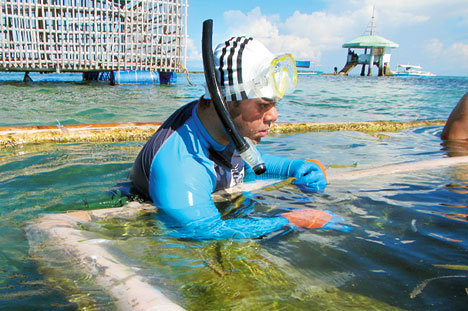I am a marine biologist working as a post-doctoral researcher at the Leibniz Centre for Tropical Marine Research (ZMT) in Bremen, Germany. This institute studies coastal ecosystems in tropical countries and finds strategies for sustainable development amidst the looming threat of climate change.
FISH FEED

• As part of my doctoral research at the University of Calcutta, I worked in the brackish waters of the Sunderbans to develop eco-friendly feed (from seaweed or macroalgae) for giant freshwater prawn or scampi. This exposure to aquaculture helped me bag the prestigious post-doctoral fellowship from the German Academic Exchange Service or DAAD, a body of German institutions of higher education.
Meanwhile, marine ecologist Andreas Kunzmann was looking for someone who could develop nutritious feed for sea cucumber, a close cousin of the starfish, savoured in east Asia for centuries. The ecophysiology group at ZMT that Kunzman leads is focussed on scientific monitoring of tropical marine ecosystems, including research in unique aquaculture, to solve future food shortage and the sea cucumber was one of the candidates. These humble creatures had been nearly decimated by poachers supplying restaurants in Hong Kong, Shanghai and Tokyo but were rejuvenated by artificial farming.
DEEP SEA DIVE

• I arrived at ZMT in 2016. The institute has sophisticated marine experimental facilities, which include a spectacular collection of huge aquariums with artificially mixed seawater heated to a tropical 26.6° Celsius. Corals, sea cucumbers and a variety of marine creatures and plants are grown in them. There's even a centre for scientific diving. I took basic lessons here, which came in handy when I had to plunge into the sea while working in the Philippines.
My research involves developing a nutritious probiotic diet for sea cucumbers. I took trips to the Philippines and Belgium to study aquaculture of these marine creatures. It's quite an exciting job. I was happy that after my DAAD fellowship expired, my institute offered me an extension.

Almost everyone on campus speaks English but I still took courses in German and picked it up fairly quickly. You won't face much difficulty inside the campus but the moment you step out, you'll have no option but to use sign language if you can't speak German.
I live in an apartment near the institute and cook for myself though I occasionally eat out. There are a few Indian students on campus and some Bengalis in Bremen. Last year, we celebrated Durga Puja with pomp and grandeur.
THE FAIRY TALE CITY
• Bremen is a small but beautiful city by the river Weser, where you can see a juxtaposition of the past and the future. The most fascinating thing is the iconic sculpture depicting the Town Musicians of Bremen - a donkey, a dog, a cat and a rooster that feature in a fairy tale of Brothers Grimm. The Schnoor - an old neighbourhood that owes its name to handicrafts associated with shipping - and the town square conserves the medieval flavour while the hi-tech space centre and EADS Astrium, home to spacecraft and fast planes, supplies the modern touch.
Public transport is cheap, affordable and impeccable in most areas. On weekends, I love travelling to the countryside by train. When I have time, I wish to go beyond to explore other European countries.
As told to Prasun Chaudhuri











